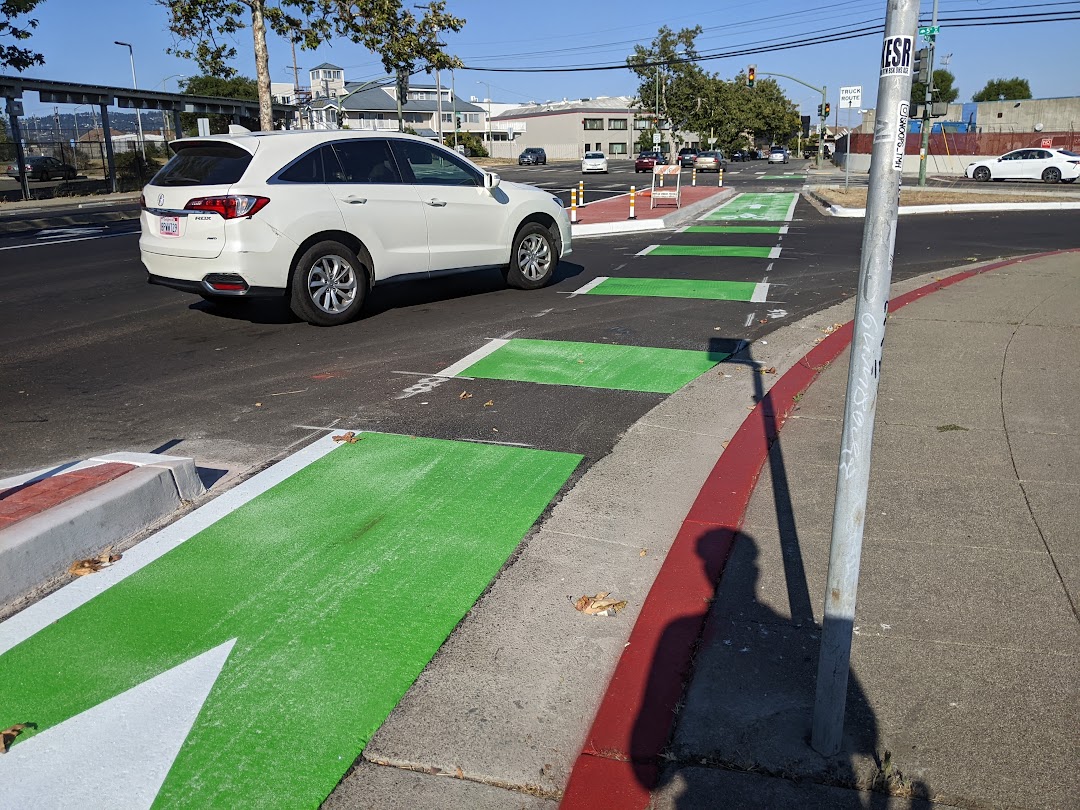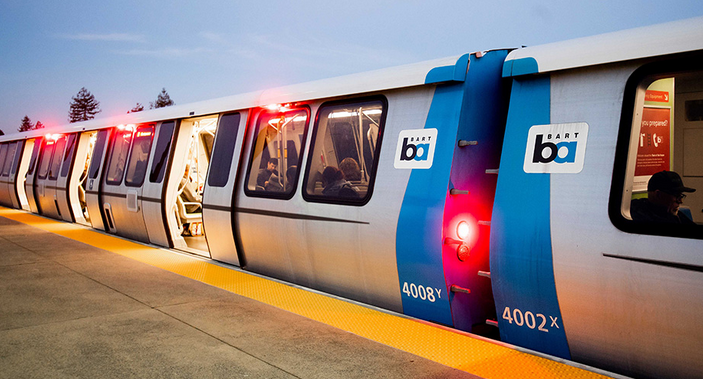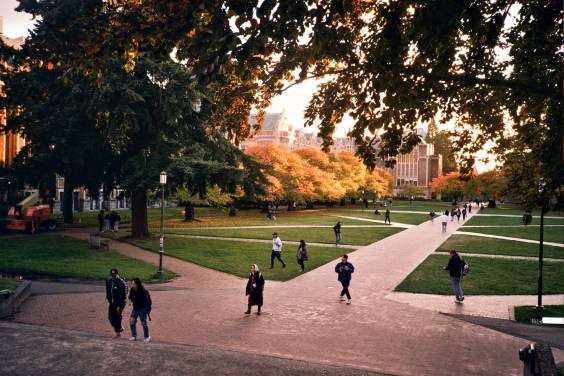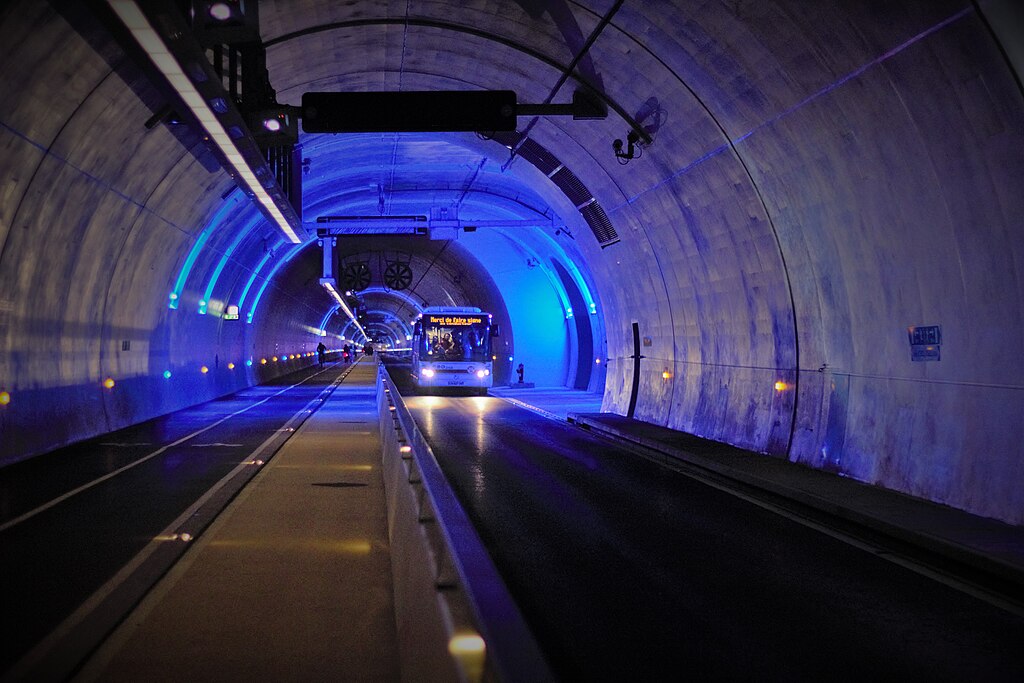Sponsored post: The Transportation Research Board’s 99th Annual Meeting will be held in Washington, D.C. from Jan. 12-16, 2020. Click here for more information.
The holiday seasons brings unwanted gift cards and sweaters that can hopefully be exchanged at Macy's, sharp bits of pine needle that have shed on your floors, the acrid post-latke scent of vegetable oil stubbornly coating your walls ... and the Streetsies!
Now's the time of year when Streetsblog takes looks back at the transportation innovations, street designs, billion-dollar boondoggles, and monstrously shortsighted political decisions that changed how we got around these past 12 months and will affect how we continue to travel in 2020.
That means we're going to give a little extra attention for your favorite transit project or notorious embarrassment. You thought we forgot about the Cleveland Hyperloop. We'll never forget about the Cleveland Hyperloop!
Most Exciting New Transit Trend: Expansion of Dockless Bikes and Scooters
If you have walked the streets of Washington D.C., Santa Monica, Oakland, or any of the scores of cities around the country granting permits to micromobility companies, you'd notice people passing by you on two-wheeled electronic scooters, bikes, and mopeds. These devices have enjoyed a remarkable two-year growth spurt from four cities at the start of 2018 to more than 70 by the end of this year.
Lime, one of the largest scooter companies, announced it reached 100 million trips by September. There have been a few hiccups this year, such as when Nashville tried to scrap a pilot program this summer after a fatality and several injuries involving crashes with vehicles and Atlanta curtailed overnight riding in August after four traffic deaths.
But cities led by Santa Monica are beginning to recognize that scooters take trips away from vehicles and are starting to look at ways of incorporating these devices and its users on the road, perhaps by widening bike paths or removing lanes of vehicle traffic, rather than banning their outright use. That's a great sign for the future of mobility everywhere.
Honorable mention: New York City's 14th Street car-free "busway," which would have won this award outright but, wait a second, why shouldn't every major crosstown street prioritize transit over cars? It should be noteworthy when cities don't do that!
The HAL 9000 Award for Most-Disturbing Transit Trend: States Allowing Autonomous Vehicles Testing
When an driverless Uber Volvo ran over a pedestrian crossing a street in Tempe, Arizona and killed her last year, the public was appalled. Unfortunately little has changed since then. Prosecutors in Arizona declined to charge Uber at the time and the National Highway Traffic Safety Administration began launched an investigation into the incident. They found Uber's software program couldn't clearly identify the pedestrian and wouldn't enable its brakes in time, which contributed to the crash. The findings laid bare at two hearings in Washington D.C. last month have done little change how the federal government regulates the automotive technology. An automotive vehicle bill circulating in Congress is drawing concerns from advocates for prioritizing innovation over public safety. And several states led by Florida are racing to change laws that would make it even more attractive for tech and automotive companies to deploy self-driving cars on local roads.
The Mike Lyden Award for Best Tactical Urbanism: Tie Los Angeles and Denver
Three temporary roadway projects in Los Angeles (right) and Denver showed the public how a simple change to street design can have a profound effect on a neighborhood's way of life. LA's Department of Transportation converted a two-way section of Little Street between Seventh Street and Wilshire Boulevard to a one-way northbound street with a colorful median and two crosswalks, which Streetsblog LA catalogued. The redesign calmed the area in front of an elementary school where families pick up and drop off their kids in Westlake/MacArthur Park. In addition the LADOT created a temporary roundabout at Fourth Street and New Hampshire for Bike-to-Work Day which was sparsely attended because it somehow rained. Hey you can't blame Los Angeles for rain but it was still a great idea.
Meanwhile activists with WalkDenver wanted to draw attention to a swath of Federal Boulevard, Denver's deadliest street, by placing painted tires, straw bales, potted flowers, beach balls, and traffic cones to create temporary sidewalks, curb extensions and islands. WalkDenver activists want to see more permanent bollards and barriers erected to create safer places to walk and bike along the road while calming traffic. The pop up showed how easy it is to give streetscape back to residents and make the area around the boulevard more livable.
The Janette Sadik-Khan Award for Best Transportation Hire: Jeffrey Tumlin, SFMTA
The Bay Area has a myriad of transportation agencies and the SFMTA, which oversees transit through its MUNI trains, buses and streetcars, parking, and streets of San Francisco, is perhaps its most influential. So you can excuse transit nerds for being especially excited that Mayor London Breed chose indefatigable transportation consultant Jeffrey Tumlin (left) to lead the agency.
A former Director of Strategy at NelsonNygaard Consulting Associates, Tumlin, who previously created a department of transportation for Oakland, has been tweeting prolifically from the buses and streetcars in the SFMTA's system to check signals and from the road where he cycles to get around.
If that weren't enough, Tumlin even gave up his car. Other regions take note — this is the kind of passion toward transit that board members and agency leaders should have.
The Donald J. Trump Award for Best Tweet: Rachel Swan and Jeff Davis
The Trump Administration announced $900 million in transportation grants today. Here's a snapshot from Transportation Weekly Express, comparing Obama administration multi-modal grants to Trump administration. pic.twitter.com/HeQkxl7mYB
— Rachel Swan (@rachelswan) November 12, 2019
We could have picked something snarky here (see Best Meme below instead), but few tweets jolted the transportation beat like San Francisco Chronicle reporter Rachel Swan's post noting the stark difference between how the Obama and Trump administrations prioritized multi-modal projects. The chart, prepared by Eno Center senior fellow and holy transit guru Jeff Davis, showed how Trump doubled spending on roads and bridges while halving funds for mass transit and rail and halting grants for bike and pedestrian infrastructure entirely. We know inherently that the Trump administration dislikes public transit and cycling but it's a chilling reminder to see the actual math.
The 'Wind Beneath Our Wings' Award for Heroism: Seattle activist redirects bus lane traffic on Olive Street
Drivers should know not to drive in a bus lane but asphalt markings don't always stop them. Fortunately on a balmy day in August, a badass, righteous activist stood in the bus lane at Sixth on Olive streets and waived vehicles to merge left where they belonged. Her fortitude inspired others to flag traffic out of the bus lane the following week. A month later, Seattle Mayor Jenny Durkan announced plans to paint 90 blocks of bus lanes red by the end of 2020. By mid-October the city got to 32 lanes.
In an ode to the woman who went semi-viral over the weekend telling drivers to get out of the bus lane, a group is here at 6th and Olive flagging cars out of the bus lane and thanking bus drivers pic.twitter.com/UxUkq6BUGV
— Heidi Groover #timeforchange (@heidigroover) August 13, 2019
The Margaret Bourke-White Award for Best Photo: Los Angeles Times of the 405 Freeway during the holiday rush
The 405 Freeway may be the most notorious highway in the nation for the volume of traffic it attracts and hours-long delays during morning and evening rush hours. But it earned its title as "World's Worst Traffic Jam" on the day before Thanksgiving in 2016 when the interstate resembles an undulating river of red and white lights.
Sure, it's three years old, but we love it every time we see it because it reminds us of the futility of highway expansion.
The $1.6-billion plan to add an extra lane on the freeway between the I-10 and the I-101 only made traffic worse as Los Angeles transportation officials and leaders are solemnly discussing the need for a north-south rail corridor through the Sepulveda pass that could cost $9 billion. One thing is clear, this kind of traffic isn't pleasant for anyone and it's killing our atmosphere.
That image of monster traffic on the 405 — glowing, unmoving, both beautiful and toxic at the same time — has become the dominant image of Thanksgiving in L.A., writes @shelbygrad: https://t.co/06OwXgNTdF
— Laura J. Nelson 🦅 (@laura_nelson) November 28, 2019
The Edsel Ford Award for Best Meme that Shows Why Cars are a Failed Technology: Pittsburgh Sinkhole
The sinkhole that nearly ate a Pittsburgh Port Authority Bus is the biggest thing to happen to Pittsburgh since "The Fish that Saved Pittsburgh." Even though it is not an "astrological disco sports extravaganza." Behold your memes:
Gotta meme the Pittsburgh pothole bus
— Kara (@karainstem) October 28, 2019
📷: @andrewrush pic.twitter.com/GyeYloEXZD
Halloween costume seen on South Side Carson St in Pittsburgh, recreating bus in sinkhole event of 4 days before
— 🏙 PittsburghTrail (@PittsburghTrail) November 1, 2019
photo credit: Brandon Ritenour pic.twitter.com/k4C0Snp1H7
https://twitter.com/IanAltenbaugh/status/1188960759851749376?ref_src=twsrc%5Etfw%7Ctwcamp%5Etweetembed%7Ctwterm%5E1188960759851749376&ref_url=https%3A%2F%2Fwww.wpxi.com%2Fnews%2Ftop-stories%2Fthe-best-port-authority-swallowed-by-sinkhole-memes%2F1002545410%2F
The Joe Pulitzer Award for Best Non-Streetsblog Journalist: Brian Rosenthal
Earlier this year, New York Times investigative reporter Brian Rosenthal began digging into why the price of taxi medallions ballooned to more than $1 million and why so many taxi drivers were taking on hundreds of thousands of dollars in debt. He found thousands of predatory loans that banks issued to medallion owners who had no ability to pay them off. Some of them committed suicide. Rosenthal's reporting has spurred federal investigations into allegations of lending fraud and talk of a taxi bailout although Mayor de Blasio dismisses that idea. This might very well be the transportation story of the year.
Rod Blagojevich Award for Most Corrupt Federal Official: Elaine Chao
Chao is one of the most-qualified cabinet officials in the Trump administration having already served as Secretary of Labor under President Bush, but that just means she knows how to tread the line between what's legal and what isn't better than her colleagues.
Mrs. Mitch McConnell was intricately connected to not one but two separate corruption scandals this year that potentially enriched her family — promoting her father's shipping company which does business with China and coaching Kentucky officials who submitted applications for highway grants at behest of her Kentucky Senator husband's office.
Chao appears in no danger of losing her job, especially since her husband is the second most powerful person in Washington, but there's a reason why trust in her leadership among DOT staffers has been falling.
The Ever-Widening Interstate 405 Boondoggle of the Year: Cleveland Hyperloop
It was a banner year for horrible highway projects that encourage more driving and the release of more carbon emissions. We had trouble choosing from the expansion of I-83 in Pennsylvania, Miami's I-395 underdeck mistake, Virginia's $2.2 billion I-81 widening and Houston's ongoing I-45 relocation headache that could cost $7 billion. But the momentum behind the Cleveland Hyperloop is a Simpsons cartoon parody come to life.
Outlets in northeast Ohio are willfully printing stories about studies declaring that this completely untested $29.8 billion with a B high-speed bullet tube could be 2028. The hype around the hyperloop is so destructive that we lured Angie Schmitt out of Streetsblog retirement to shake some sense into her fellow Midwesterners. Hey Cleveland, Don't be like Brockway, Ogdenville, and North Haverbrook. You have a good thing going. Think about an actual statewide rail network first.
The Dwight David Eisenhower Award for Worst New Transportation Plan: Connecticut
Gov. Ned Lamont didn't intend on transportation to become his top priority in his first year in office, but when his administration let slip that he considered adding toll plazas on state roadways to raise some much-needed revenue and mitigate traffic, it quickly dominated the conversation.
Lamont, a Democrat, removed tolls from the legislative agenda this summer and quietly reintroduced a slimmed down version in his new transportation plan this fall. The problem now is that Lamont is proposing to spend twice as much money widening highways as he is in public transit and there's almost no money toward bike and pedestrian infrastructure in a state that ranks in the top 10 in vehicle miles traveled. Hopefully this is just a starting point and those numbers will move in the beginning of next year.
The Rudy Giuliani Award for Over-Policing: Tie, Sandwich Guy and Churro Lady
In the space of a week in November, cops in Oakland and Brooklyn thoroughly distinguished themselves for harassing people of color who were eating and selling food in the subway. Since when is this kind of "broken windows"-style policing making everyone safer? We'll save you the guesswork, it isn't. At least Bay Area transit officials apologized for the overreaction of arresting a man who was eating a sandwich. The same level of regret for cops detaining a churro lady and impounding her cart hasn't come from the MTA. Expect more demonstrations and anger from city and state officials in the new year over the cost and presence of police in city subways.
The Yoenis Cespedes Comeback of the Year Award: Amtrak
The much-maligned long-distance rail service might become profitable next year for the first time in its history but that's not why its leaders are smiling. Its Acela and Northeast lines experienced record ridership levels in the 2019 fiscal year. And its CEO is committed to boosting performance on shorter inter-city rail trips to compete effectively with driving and flying while enhancing regional commuter rail service. Congress may even give the railroad more money when lawmakers vote to reauthorize the FAST Act and new lines in the Gulf Coast and the upper midwest could be opening in the coming years.
Special Cecil B. DeMille Award for Achievement of the Decade: Bike Share
The 2010s were a decade of stark transition, with urban areas prospering to recover more quickly from the recession than rural ones. As cities became denser and its residents less dependent on cars, shared mobility services like Uber, Car2Go, and electronic scooters proliferated. But there is simply no transportation innovation that changed more lives for the better than bike share. The humble Citi Bike (or Jump Bike, B-Cycle, and others in your town) introduced more people to cycling while expediting the installation of bike lanes in cities across the country and reducing carbon emissions. Suddenly people had another way to make short trips through their neighborhoods without polluting the environment.
Anything that is cool enough for the dating lives of both Leonardo DiCaprio and Streetsblog NYC's Dave Colon is worthy of recognition (until states start ruining it with helmet laws).






